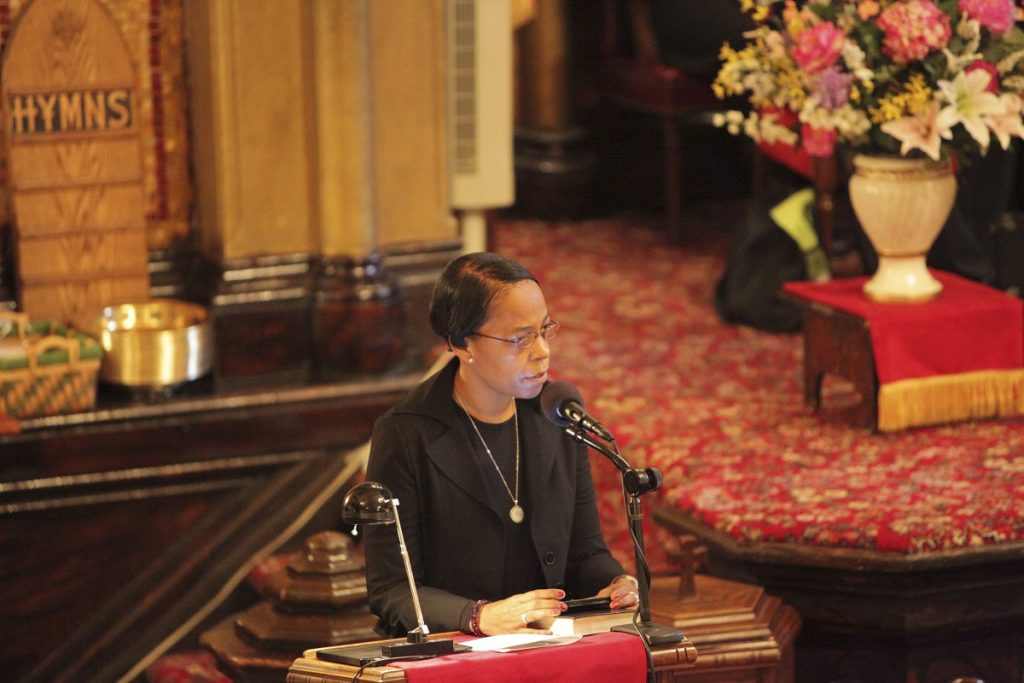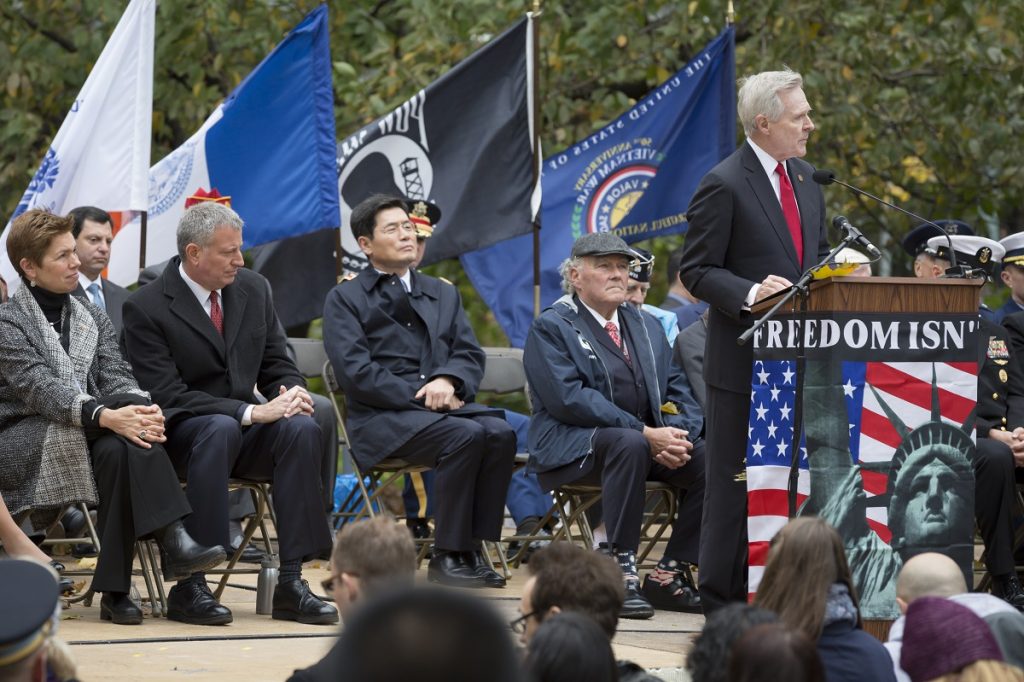A commemorative speech honors or celebrates a person, event, or occasion. They might remember someone who has died or mark a birthday, anniversary, founding, or history of achievements. The speech should inspire listeners to reflect and feel pride, gratitude, or loss.
In public speaking, a commemorative speech pays tribute to a person, a group, an institution, an event, or an idea. It’s also known as a ceremonial speech or epideictic speech.
What Is A Commemorative Speech?
Specific types of commemorative speeches honor a particular time of life. There are different types of commemorative speeches, such as a eulogy (a speech delivered at the funeral or memorial services of a deceased loved one), a graduation speech, and an award acceptance speech.
In speech writing, people also consider a tribute speech that highlights the achievements of a person, a group, or an organization and a farewell speech given when someone leaves a community or institution) as a commemorative speech.
Any special occasion speech (e.g., wedding toasts, anniversary speeches, and retirement remarks) that focuses on celebrating the significance of an event is also a type of commemorative or ceremonial speech.

What Is The Goal Of A Commemorative Speech?
Each type of speech has a specific purpose. An informative speech informs the audience about a particular topic, while a persuasive speech convinces others to support a certain viewpoint. A motivational speech inspires others to change something in their lives. On the other hand, a good commemorative speech aims to honor and pay homage to a person, event, or idea.
While it may contain elements of informative, persuasive, and motivational speeches, the ultimate goal of a commemorative speech is to create a strong sense of appreciation. It shines the spotlight on human values, evoking positive emotions and inviting the audience members to reflect.
For example, in his speech on the 20th anniversary of the 9/11 attacks, U.S. President George W. Bush emphasized human courage as he honored the gallantry of American soldiers who volunteered to serve after the terroristic act.
A part of his speech went, “These Americans were brave, strong, and united in ways that shocked the terrorists – but should not surprise any of us. This is the nation we know. And whenever we need hope and inspiration, we can look to the skies and remember.”
What Should Be Included In A Commemorative Speech?
As with other speeches, a commemorative speech mainly has three parts. It has an intro where you give a hook that will attract the audience’s attention, and you present the topic and purpose of your speech.
In the body, you celebrate the values exemplified and achievements reached by the person or group you’re commemorating. If you’re honoring an event, this is where you showcase the importance of the said event, the key players behind it, and the lessons the audience must learn from it.
The conclusion is a summary of your major points. It’s also an opportunity to emphasize how the subject will influence the present and the future.
In the rest of the speech, there are certain elements that you can incorporate to make the commemorative speech more effective. You can add a personal touch and connection (e.g., share your personal relationship with or experience about the subject) to add a strong sense of authenticity to your narrative.
Apart from the key qualities and accomplishments of the subject, you can inject personal observations to add depth to your speech. You can also use figurative language and imagery to enhance the emotional appeal of your piece and paint a more compelling picture.
When writing a commemorative speech, the bottom line is to write from the heart — without sacrificing the accuracy and truthfulness of your piece.

What Is A Commemorative Speech Outline?
Is it your first time crafting this kind of speech? Here’s a commemorative speech outline template that can serve as your guide.
- Introduction
- Attention statement
- Thesis statement
- Relevance of the topic to your audience
- Preview of your main points and
- Body
- Main points with subject statement
- Illustration (examples, supporting stories)
- Conclusion
- Summary of main points
- Thesis statement emphasis
- Closing statement
What Are Some Commemorative Speech Topics?
Look around, observe, and you’ll see several human values, people, and events worth commemorating. But if you’re stuck and can’t seem to find commemorative speech topics to talk about, here are some commemorative speech ideas to spark inspiration (You can also use this list when you brainstorm with your peers).
- A tribute to outstanding figures throughout history (e.g., Neil Armstrong, Martin Luther King, Abraham Lincoln, Marie Curie, Meryl Streep)
- A celebration of significant events and movements (e.g., the end of World War II, the dawn of the Internet, Independence Day, civil rights movement)
- A commemoration of your own achievements (e.g., the day you landed your dream job, your wedding anniversary, the first book you published)
- A homage to the people around you and who touched your life (e.g., your parents or any other family member, your trusted mentor, your favorite high school teacher, the dedicated police officer in your neighborhood)
- A spotlight on human values (e.g., human resilience during the pandemic, creativity, loyalty)

How Do You Start A Commemorative Speech Example?
The most effective commemorative speeches have one thing in common: a memorable intro. If you want to write or deliver a truly inspiring commemorative speech, spark audience interest in the first sentence or two.
One of the best ways to start a commemorative speech is to recount a story or an anecdote. Note that our brains are hardwired to be interested in stories. So telling one to open your speech will help capture your audience’s attention.
You can also use a relevant quote, metaphor, or figure of speech. Another way is to ask the crowd a relevant question. As with other types of speech, you can also begin with an interesting fact or statistic, a hypothetical scenario (“what if,” “imagine”), a recollection, or a really bold statement.
Going back to President Bush’s 9/11 anniversary speech, this was how he commenced his piece — through a recollection of the past: “Twenty years ago, we all found — in different ways, in different places, but all at the same moment — that our lives would be changed forever. The world was loud with carnage and sirens and then quiet with missing voices that would never be heard again. These lives remain precious to our country and infinitely precious to many of you. Today we remember your loss, we share your sorrow, and we honor the men and women you have loved so long and so well.”
What Is An Example Of A Commemorative Speech?
[Note to Editor – Copyscape hits because of the snippet below]
You can find several commemorative speech examples on the web. One of the best speech examples was President Lyndon B. Johnson’s “Great Society” speech, which he delivered at a University of Michigan graduation ceremony in 1964.
Here’s a snippet:
“For a century, we labored to settle and to subdue a continent. For half a century, we called upon unbounded invention and untiring industry to create an order of plenty for all of our people.
The challenge of the next half century is whether we have the wisdom to use that wealth to enrich and elevate our national life and to advance the quality of our American civilization.
Your imagination, your initiative, and your indignation will determine whether we build a society where progress is the servant of our needs or a society where old values and new visions are buried under unbridled growth. In your time, we have the opportunity to move not only toward the rich society and the powerful society but upward toward the Great Society.
The Great Society rests on abundance and liberty for all. It demands an end to poverty and racial injustice, to which we are totally committed in our time. But that is just the beginning.”

